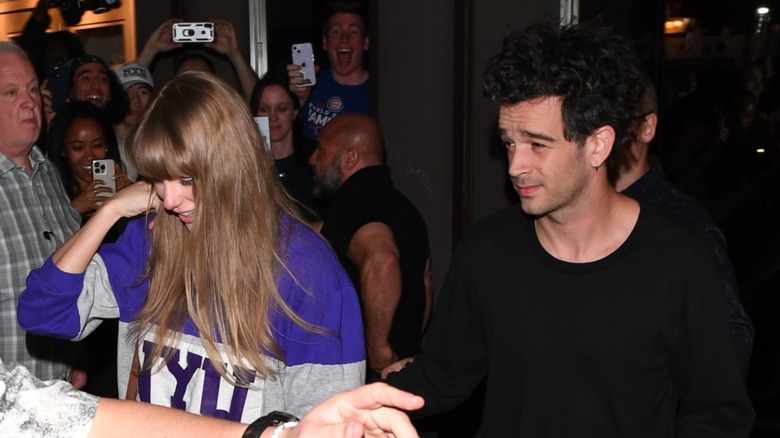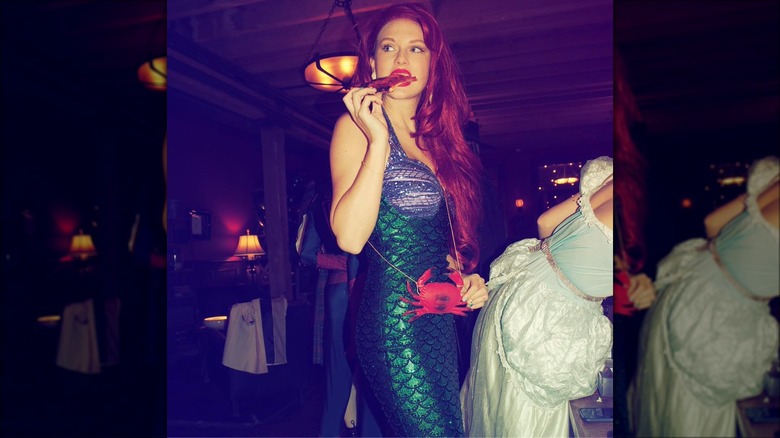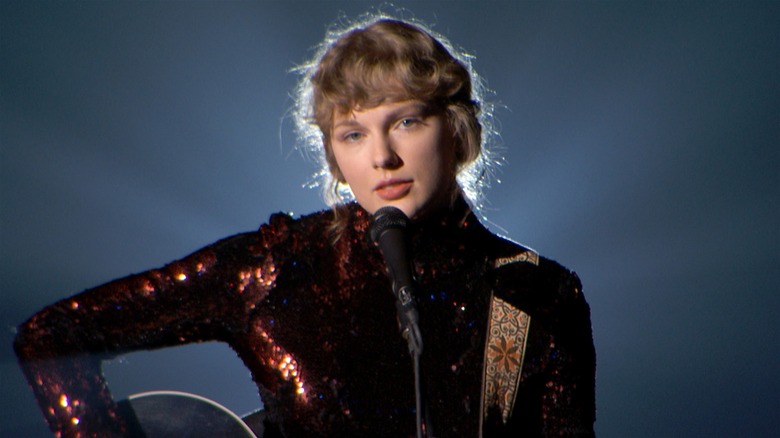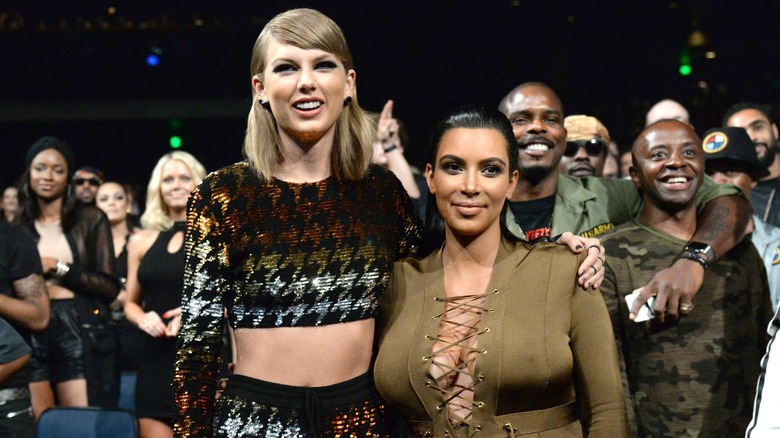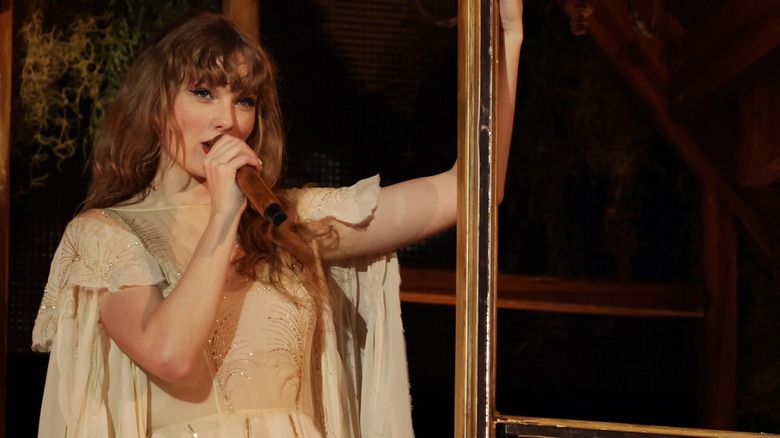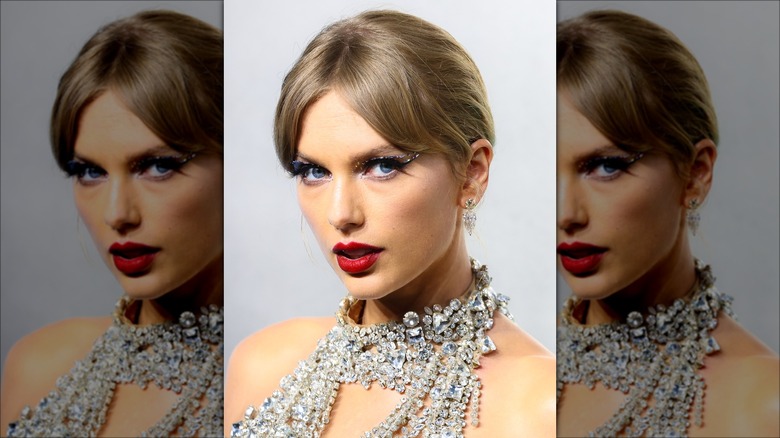All The References In The Tortured Poets Department Song Titles, Explained
At the 2024 Grammy Awards, Taylor Swift announced that her 11th album, "The Tortured Poets Department," would be released on April 19. The tracklist was unveiled shortly after the initial announcement, giving fans months to pore over titles like "So Long, London" and "The Black Dog," wondering what those song names could possibly indicate about their content. Swifties love that her music is so diaristic, letting fans in on her romantic foibles and her struggles with fame; where Swift is concerned, a tracklist can be a clue just as much as, well, an Easter egg-filled pop-up "library" installation at The Grove in Los Angeles.
Two hours after the album dropped, Swift announced on Instagram that "The Tortured Poets Department" was actually a double album with 31 tracks in total, giving fans even more song titles to pore over. Never fear, Swifties; we've got a handy explanation of the most cryptic, symbolic titles below.
Fortnight is about a brief relationship
In early 2023, Taylor Swift had a whirlwind romance with The 1975 frontman Matty Healy. They were first spotted together in Nashville on May 7, 2023; by June 5, 2023, word got out that they were over.
In "Fortnight," the first track on "The Tortured Poets Department," Swift describes a short-lived relationship. "I touched you for only a fortnight," she sings. While that word refers to a two-week span of time, they seem to have been together a little longer. Call it poetic license, maybe, or perhaps they went their separate ways sooner than we knew. Regardless, the song definitely appears to be about Healy. It's also worth noting "fortnight" is primarily British English, not too common in America — perhaps a nod to Healy, who is from the United Kingdom.
There's another important clue, too: she also sings, "I love you, it's ruining my life." During that relationship, Swift faced an intense amount of criticism from her fans thanks to Healy's controversial appearance on "The Adam Friedland Show." Racist jokes were made about Swift collaborator Ice Spice, and Healy didn't push back, so fans pushed back against Swift for dating him. That criticism crops up several times on the album.
She's not sure she wants to be part of The Tortured Poets Department
After Taylor Swift announced "The Tortured Poets Department," fans soon made a connection to her ex-boyfriend Joe Alwyn. In a 2022 interview with Variety, Alwyn had revealed that he was in a group text with Paul Mescal and Andrew Scott called "The Tortured Man Club." Swifties speculated that the title track of the album would be related to Swift's breakup with Alwyn.
Instead, the actual song seems to be about Matty Healy. She describes a self-important musician coming over to write poetry on a typewriter, and the title is ironic as she "thinks but doesn't say" a number of things that reveal what she truly thinks of her position in the cultural canon. "You're not Dylan Thomas, I'm not Patti Smith / This ain't the Chelsea Hotel, we'rе modern idiots," she sings.
Thomas is a poet best known for "Do not go gentle into that good night," while Smith was an influential singer-songwriter. The Chelsea Hotel was the epicenter of a cultural movement that included artists like Smith, Bob Dylan, and Janis Joplin. In other words, Swift is saying that she and her contemporaries don't measure up to those legends; instead, all they're doing is writing tortured poetry.
So Long, London says so long to her London Boy
For a while during Taylor Swift's relationship with Joe Alwyn, they lived together in London, hunkering down in the capital city of Alwyn's native England. She fell in love with the city, as she detailed on her "Lover" era track "London Boy." In that song, Swift shouts out Camden Market and sings, "Took me back to Highgate, met all of his best mates / So I guess all the rumors are true / You know I love a London boy."
Now that Swift's relationship with Alwyn is over, it's time for her to say goodbye to the city she loved. "So Long, London" is both about letting go of the place where they made memories, and the London Boy she made memories with. "So long, London / You'll find someone," she sings, finally giving up on a relationship she says she tried to save.
But Daddy I Love Him, said the Little Mermaid
"But Daddy I Love Him" refers to a line from "The Little Mermaid," plucked from a scene where Ariel tries to convince King Triton that she should be able to stay with Prince Eric. It's a moment of "teenage petulance," as Taylor Swift sings in "Down Bad." We know Taylor Swift is a fan; after all, she dressed as Ariel during a 2019 costume party, as seen on Instagram.
In the song, Swift bristles at critics — or even fans — who told her not to date someone. There's speculation this one is about Matty Healy, too; plenty of Swifties expressed their concern at her romantic choices, leading to lyrics like, "Sarahs and Hannahs in their Sunday best / Clutchin' their pearls, sighing, what a mess."
Ultimately, like Ariel, Swift concludes that she is going to do what she wants, even though people around her are telling her to stay away from that guy. "I'd rather burn my whole life down / Than listen to one more second of all this b**chin' and moanin'," she sings. If Swift were indeed to burn her life down, jeopardizing her singing career, we might even say that she's given up her voice... just like Ariel.
Taylor performed a pivotal show in Florida
On "Florida!!!" Taylor Swift shouts out the state where she first performed after the public learned that she'd broken up with longtime boyfriend Joe Alwyn. That news broke on April 8, 2023; by April 13, she was back on stage for the Tampa stop of The Eras Tour. Swifties know that "13" is a key number in the Taylor Swift universe, so it's no surprise that this show took on additional significance for the "Love Story" singer.
In the song, Swift sings with Florence + The Machine about all of the shenanigans one can get up to in Florida. They paint the state as a swampy place where one can do bad things, go a little crazy, and have people not notice. In particular, Swift looks to the Sunshine State to help her escape her troubles. "I need to forget, so take me to Florida," they sing. "I've got some regrets, I'll bury them in Florida." As on "I Can Do It With A Broken Heart," performing is her way to ignore her pain.
Taylor Swift is a supervillain on Who's Afraid of Little Old Me?
On her "Midnights" single "Anti-Hero," Taylor Swift fashioned herself into the sort of bad-girl character one might enjoy watching anyway. "It must be exhausting always rooting for the anti-hero," she sings, understanding herself as a complicated cultural figure whose mistakes and actions endear her to an audience nonetheless.
On "The Tortured Poets Department," the anti-hero has become a full-fledged villain. The title of "Who's Afraid Of Little Old Me?" calls back to "Who's Afraid Of The Big Bad Wolf?," a Disney ditty sung by the three little pigs to prove they're not scared. The song title then led to "Who's Afraid Of Virginia Woolf?," an Edward Albee play that was adapted into a well-known film starring Richard Burton and Elizabeth Taylor; remember that lyric in "... Ready For It" where she says her lover can be "Burton to this Taylor?" That movie is about two academics who play a twisted psychological game on their unsuspecting guests, acting wretched just to see how people react.
The song's lyrics put Swift in a similar position, reveling in her villain status. "So I leap from the gallows and I levitate down your street / Crash the party like a record scratch as I scream / 'Who's afraid of little old me?'" Swift sings, before adding, "You should be." If people are going to doubt her intentions at every turn, in other words, then she's going to lean into it.
loml doesn't mean what you expect
According to Urban Dictionary, "loml" has been internet-speak for "love of my life" since at least 2005. The acronym is usually sent to a loved one, used as a way to appreciate someone for what they've brought to your life.
The Taylor Swift track "loml" starts out in a similar way. "You said I'm the love of your life," she sings over a gorgeous, Aaron Dessner-produced piano line. However, the relationship seems to burn bright and fast, and Swift doesn't necessarily feel the same way. "It was legendary / It was momentary / It was unnecessary," she sings in the song's bridge.
It's not until the song's final moments that we finally learn what Swift's version of the acronym means. Though the relationship ends quickly, Swift found something fulfilling in the feeling, and she concludes the song with a different version of the popular internet slang. "I'll still see it until I die / You're the loss of my life," she decides.
Clara Bow was an Old Hollywood star
On "Clara Bow," Taylor Swift shouts out one of the original Hollywood icons. Bow was renowned for her beauty all around the world, making her one of the very first "it girls" to emerge from Hollywood. The lyrics of the song paint her as a touchstone who people get compared to all of the time, a high-water mark for stardom that those in charge are looking to replicate.
However, Clara Bow had quite the tragic life, and she didn't handle fame (or its loss) well. She struggled with addiction and mental illness, afflictions likely brought on by the extreme pressures of being one of the most recognizable women to ever live. To be compared to Clara Bow in a positive way, then, is to ignore all of the suffering that happened behind the scenes.
In the song's final moments, Swift imagines a younger singer being told, "You look like Taylor Swift in this light." It's a haunting moment to end the standard version of the album on, imagining someone coming up in her wake who has no idea about the extreme pressures of fame that lie in wait.
The Black Dog signals approaching doom
Both of Taylor Swift's most recent exes, Matty Healy and Joe Alywn, are British. In British folklore, a black dog is often seen as a symbol for approaching doom. In a piece for The Great Lakes Journal of Undergraduate History, writer Sheilagh Quaile traced this back to the ancient Greeks, noting, "Plutarch, writing in 450
BCE, wrote of a black dog appearing before a man to portend of his near-at-hand death." She also pointed out that many British institutions have adopted the Black Dog as a name, for everything from prisons to pubs.
Swift sings about a pub with that name in "The Black Dog," the first additional song on the "Anthology" edition of "The Tortured Poets Department." She recounts a moment where she sees her lover walking into that bar. She's surprised to find that her lover doesn't want her back the way she expected; the black dog, then, could represent an omen indicating the final end of the relationship.
There's another British association with black dogs, too. According to the BBC, Churchill often spoke about his experience with depression in terms of a "black dog" that followed him around. The Taylor Swift song could be describing a form of depression, too, as she sings, "Now I wanna sell my house / And set fire to all my clothes / And hire a priest to come and exorcise my demons / Even if I die screaming."
The Albatross is from a Coleridge poem
The title of Taylor Swift's song "The Albatross" is a reference to Samuel Taylor Coleridge's poem "The Rime of the Ancient Mariner." It's about a sailor recounting an incident aboard a ship, a fateful day where he shot a bird flying overhead. After he committed this crime against nature, the ship appears to be cursed, and the ancient mariner wears the albatross around his neck as a reminder of what he's done.
This is a song about shifting blame, about men viewing her as a terrible omen when really it's their own actions that affect them, not their association with her. In other words, the mariner killing the albatross is what apparently cursed them; it wasn't the albatross itself. "She's the albatross," Swift sings about herself, imagining a man who's afraid that being with her will curse him in the eyes of the public.
"And when that sky rains fire on you / And you're persona non grata / I'll tell you how / I've been there too / And that none of it matters," Swift sings, once again expressing her displeasure with the public's interest in her love life. If she's going to be viewed as a romantic curse, an albatross around the neck of any man she dates, she wants to reassure him that they can ignore others trying to place blame.
Those capital letters in thanK you aIMee tell us everything
"thanK you aIMee" is one of the angriest songs that Taylor Swift has ever released, one of the most openly-spiteful examples of her telling someone exactly how they made her feel. She even sings that her mother wishes the person — referred to as "Aimee" in the song — would die.
In the song's final few moments, Swift reveals her songwriting process, peeling back the layers to make it obvious that she's transposed the setting to high school and changed some names. "I don't think you've changed much / And so I changed your name and any real defining clues / And one day, your kid comes home singin' / A song that only us two is gonna know is about you," she sings.
Only those two ... and anyone who looks at the name of the song. Swift has capitalized three letters: K I M. Naturally, this has led fans to suspect "Aimee" is actually a not-so-subtle nod to North West's mom, Kim Kardashian, suggesting Swift is still not over their very public feud from years ago. Still, she acknowledges, she wouldn't be where she is without that formative experience. Thus, "f*** you Aimee" becomes "thank you Aimee."
Cassandra was a prophet no one believed
In Greek mythology, Cassandra was a Trojan priestess who was cursed by the gods. While her predictions about the Trojan War were always true, they were never believed by others. Rather, her prophecies were written off, and she was thought to be a liar.
Taylor Swift clearly feels a kinship with the ancient prophet. The lyrics of "Cassandra" seem to be, once again, about her feud with Kanye West and Kim Kardashian. "So, they killed Cassandra first 'cause she feared the worst / And tried to tell the town / So, they filled my cell with snakes, I regret to say / Do you believe me now?" Swift sings, presumably referencing the snake emojis that filled her Instagram after Kardashian's infamous "receipts" moment. Nowadays, though, with Kanye West continuing to do problematic and shocking things and Kim Kardashian no longer married to him, Swift seems to wonder if the historical record will finally acknowledge she was the wronged party in that encounter.
That bit about Trojans considering Cassandra manic resonates, too. In an Instagram post about "The Tortured Poets Department," Swift explained that the album was written during a time in her life "that was both sensational and sorrowful in equal measure." She added, "This period of the author's life is now over."
The titular Peter is definitely Peter Pan
Sometimes, Taylor Swift's songs named after specific people can be quite obscure; see, for example, "Chloe or Sam or Sophia or Marcus" from this very album. "Peter," on the other hand, is pretty obvious in its symbolism.
Swift sings to someone who is still being childish. "You said you were gonna grow up / Then you were gonna come find me," Swift sings, suggesting that their initial split was meant to only be temporary. Instead, the person she's singing to never came back. "And the shelf life of those fantasies has expired / Lost to the 'Lost Boys' chapter of your life."
That "Lost Boys" line is the key to unlocking this song's symbolism. She's singing about someone as though they were Peter Pan, the iconic boy who refused to grow up. Lost in Neverland, Peter kept hanging out with other boys who didn't want to grow up. If we assume this one is about Joe Alwyn, we can gather that Swift is upset he seemingly didn't want to take the necessary next step in their relationship: marriage.
Robin might be about Winnie the Pooh's human friend
There aren't many clues in the lyrics of "Robin" that might help us understand what the song is about, exactly. In fact, the name "Robin" is never once said in the song's lyrics.
However, just like "Peter," context clues can help us here. Like that song, this one seems to be directed to a child, an exploration of someone who isn't yet aware of all the pain that awaits them in the grown-up world. The lyrics paint a picture of swing sets and games of childlike imagination. "Way to go, tiger," she sings, promising that everyone has decided to keep the person innocent for as long as possible.
In that context, we might conclude the "Robin" here is Christopher Robin, human friend to Winnie the Pooh and Tigger, too. Swift admires the way "Robin" can throw himself into his imaginary world, and she wants to protect the innocence that was denied to her.


